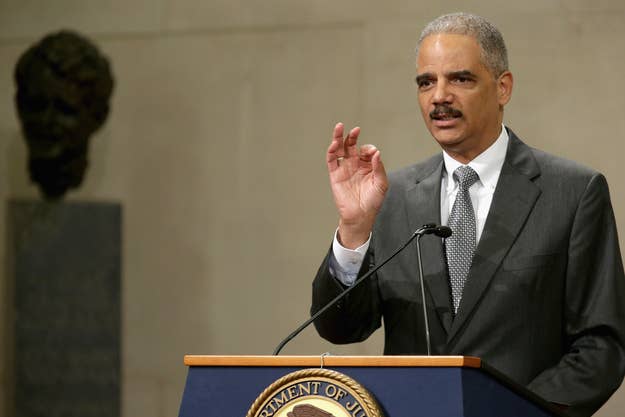
WASHINGTON — Leading civil liberties groups criticized comments made by the Democratic Party's communications director that media groups refusing to attend an off-the-record meeting with Attorney General Eric Holder are giving up their "right [to] gripe" about the Department of Justice's pursuit of journalists' records under Holder's leadership.
"I think that what the Department of Justice is doing in soliciting comments ... is in principle a good thing, but the suggestion that news organizations somehow give up their right to object by not accepting the invitation is a problem," said Gabe Rottman, legislative counsel and policy advisor at the American Civil Liberties Union's Washington legislative office.
After New York Times executive editor Jill Abramson announced the paper would not be attending a meeting with Holder to discuss the DOJ policies for dealing with reporters in leak investigations, Democratic Party communications director Brad Woodhouse tweeted:
POTUS asked AG to review how leak investigations are done but some in the media refuse to meet with him. Kind of forfeits your right gripe.

Brad Woodhouse
@woodhouseb
POTUS asked AG to review how leak investigations are done but some in the media refuse to meet with him. Kind of forfeits your right gripe.
Abramson had said in a statement, "We will not be attending the session at DOJ. It isn't appropriate for us to attend an off the record meeting with the attorney general." The Associated Press also will not be attending if the meeting remains off the record.
The ACLU's Rottman defended the news organizations' decisions.
"The notion that because news organizations have off-the-record rules which prevent them from going to a meeting like this in no way impacts the strength of their argument against the Associated Press subpoena," he said. "That's the biggest concern that I see here, that somehow they're giving up their right to complain or object — that's just wrong."
The bottom line, the head of the Reporters Committee for Freedom of the Press told BuzzFeed, is that "real issues" remain, regardless of how or whether the meeting proceeds.
"Whether or not media organizations choose to send a bureau chief to an off-the-record meeting with the Attorney General, there are still real issues with DOJ practices that need to be addressed and which we hope will be addressed regardless of how the review process initially gets off the ground," RCFP executive director Bruce Brown told BuzzFeed Wednesday evening.
When a person told Woodhouse in response to his initial tweet that "public officials shouldn't request off the record meetins with reporters," Woodhouse replied:
By that logic, journos shouldn't accept anonymous leaks RT @justinmclachlan: @woodhouseb public officials ... http://t.co/uvdS857YyS

Brad Woodhouse
@woodhouseb
By that logic, journos shouldn't accept anonymous leaks RT @justinmclachlan: @woodhouseb public officials ... http://t.co/uvdS857YyS
The ACLU's Rottman again differed with the Democratic Party spokesman's line there.
"This is very different. These news organizations are trying to maintain their independence. [T]he Department of Justice, in reaching out to media organizations and public interest groups, is doing the right thing in terms of soliciting input in how to improve the guidelines for when they can issue subpoenas like they did in the Associated Press case. But news organizations can preserve their independence, and if they're called into an off-the-record meeting where they can't comment [on what was said], I think there's a legitimate concern that the DOJ can then say, 'We solicited their comment and we're making these changes,' and it almost hamstrings the ability of news organizations to object to what the DOJ decides to do," Rottman said.
"This is actually a newsworthy event," he said of the planned meeting. "News organizations want to maintain their ability to report if something newsworthy happens in the meeting."
Update: After this story was posted, Woodhouse clarified his earlier tweet, writing:
Of course people have a right to gripe, my feed demonstrates that. Main point was I don't see how refusing to attend helps solve anything.

Brad Woodhouse
@woodhouseb
Of course people have a right to gripe, my feed demonstrates that. Main point was I don't see how refusing to attend helps solve anything.
